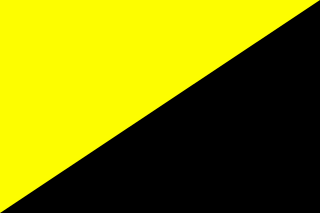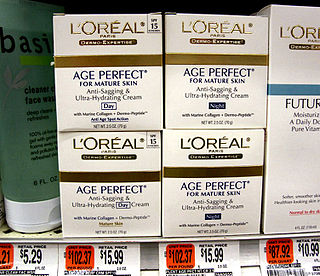
Anarcho-capitalism is an anti-statist, libertarian, and anti-political philosophy and economic theory that seeks to abolish centralized states in favor of stateless societies with systems of private property enforced by private agencies, the non-aggression principle, free markets and the right-libertarian interpretation of self-ownership, which extends the concept to include control of private property as part of the self. In the absence of statute, anarcho-capitalists hold that society tends to contractually self-regulate and civilize through participation in the free market, which they describe as a voluntary society involving the voluntary exchange of services and goods. In a theoretical anarcho-capitalist society, the system of private property would still exist and be enforced by private defense agencies and/or insurance companies selected by customers which would operate competitively in a market and fulfill the roles of courts and the police. According to many anti-capitalist modern anarchist schools of thought, the word "anarchy" is sometimes considered to be the antithesis of hierarchy, therefore, "anarcho-capitalism" is sometimes considered to be a term with differences philosophically to what they personally consider to be true anarchism, as an Anarcho-Capitalist society would inherently contain hierarchy – though said hierarchy is largely considered consensual. This point is typically responded to by Anarcho-Capitalists by pointing out that etymologically, "anarchy" simply means "the absence of government," and by arguing that the stark difference between "government" and "governance" be considered; thus, many believe the philosophy's common name is indeed consistent, as it promotes private governance, but is vehemently anti-government.
"I define anarchist society as one where there is no legal possibility for coercive aggression against the person or property of any individual. Anarchists oppose the State because it has its very being in such aggression, namely, the expropriation of private property through taxation, the coercive exclusion of other providers of defense service from its territory, and all of the other depredations and coercions that are built upon these twin foci of invasions of individual rights." -Murray Rothbard in Society Without a State

Muesli is a cold breakfast dish, the primary ingredient of which is rolled oats, which is set to soak overnight and eaten the next morning. Most often, additional ingredients such as grains, nuts, seeds, and fresh or dried fruits, are added, along with milk or cream, a squeeze of citrus juice and, honey to add sweetness. Yoghurt or other mammal or plant milk products are now commonly added to both homemade and commercially packaged muesli recipes.

Anti-aging creams are predominantly moisturiser-based cosmeceutical skin care products marketed with the promise of making the consumer look younger by reducing, masking or preventing signs of skin aging. These signs are laxity (sagging), rhytids (wrinkles), and photoaging, which includes erythema (redness), dyspigmentation, solar elastosis (yellowing), keratoses, and poor texture. Anti-aging supplements are a set of ingestible products that are designed to reduce or diminish the effects of aging. This includes things such as vitamin supplements, powders and teas. They are designed to reduce or diminish the effects of aging. Many products seek to hide the effects of aging while others claim to alter the body's chemical balances to slow the physical effects of aging. A comprehensive grading scale for anti-aging of the skin has been validated and categorizes skin aging as: laxity (sagging), rhytids (wrinkles), and the various categories of photoaging, including erythema (redness), dyspigmentation, solar elastosis (yellowing), keratoses, and poor texture.
A private label, also called a private brand or private-label brand, is a brand owned by a company, offered by that company alongside and competing with brands from other businesses. A private-label brand is almost always offered exclusively by the firm that owns it, although in rare instances the brand is licensed to another company. The brand usually consists of products, but can also encompass services.

Starburst is the brand name of a box-shaped, fruit-flavoured soft taffy candy manufactured by The Wrigley Company, which today is a subsidiary of Mars, Incorporated. Starburst has many different varieties, such as Tropical, Sour, FaveREDs, Watermelon, Very Berry, Superfruit, Summer Blast and Original.
.bb is the Internet country code top-level domain (ccTLD) for Barbados.

The free-culture movement is a social movement that promotes the freedom to distribute and modify the creative works of others in the form of free content or open content without compensation to, or the consent of, the work's original creators, by using the Internet and other forms of media.

Lotion is a low-viscosity topical preparation intended for application to the skin. By contrast, creams and gels have higher viscosity, typically due to lower water content. Lotions are applied to external skin with bare hands, a brush, a clean cloth, or cotton wool.

Origins Natural Resources, Inc., trading as Origins, is an American cosmetics brand founded in 1990 by Leonard Lauder, son of Estée Lauder. It is one of the original brands of The Estée Lauder Companies.

BB cream is a marketing term that stands for blemish balm, blemish base, beblesh balm, and in Western markets, beauty balm. Products marketed as BB creams are generally designed to serve as a foundation, moisturizer, and sunscreen all at once.

A diffusion line is a secondary line of merchandise created by a high-end fashion house or fashion designer that retails at lower prices. These ranges are separate from a fashion house's "signature line", or principal artistic line, that typically retail at much higher prices. Diffusion products may be on sale alongside designers' signature line but they can also be made available at concession outlets and certain chain stores. The use of a diffusion line is a part of the strategy of massification where luxury brands attempt to reach a broader market in order to increase revenue and brand recognition.

CC cream is a marketing term coined in the wake of the marketing term Blemish Balm cream or Beauty Balm. "CC cream" is used by some brands to mean Color Control cream, or Color Correcting cream, and some brands claim to reduce the appearance of skin redness or sallowness or to improve uneven skin tone. BB creams and CC creams are both tinted moisturizers containing sun protection. There is no scientific definition for either term, nor is there quantifiable basis for difference between BB creams and CC creams: differences between the two vary from brand to brand. BB cream was originally formulated in Germany and has, in recent years, gained popularity in Asia, especially South Korea, and is also gaining popularity in Europe and North America.

Korea has an ancient history of cosmetics use, and today it is an important industry in South Korea.
A beauty YouTuber, commonly referred to as a "beauty vlogger", "beauty guru", or "beauty influencer," is a person who creates and posts videos to YouTube about cosmetics, fashion, hair-styling, nail art, and other beauty-related topics. As of 2016, there were more than 5.3 million beauty videos on YouTube, and 86 percent of the top 200 beauty videos were made by beauty vloggers as opposed to beauty brands.

Milk Makeup is a New York City-based cosmetics and skin care company created by the founders of Milk Studios.

Halo Top Creamery is an ice cream company and brand sold in the United States, Australia, Mexico, Canada, Ireland, New Zealand, the Netherlands, Germany, Denmark, Taiwan, South Korea, Austria, United Kingdom and the United Arab Emirates. The brand is marketed as a lower-calorie alternative, partially substituting sugar with stevia, a plant-based sweetener, and erythritol, a sugar alcohol.
ColourPop Cosmetics, also known as ColourPop, is an American cosmetics brand based in Los Angeles, California. The company was founded in 2014 by siblings Laura and John Nelson. ColourPop products are sold through their website and at Ulta Beauty. They predominantly make products for the eyes, lips, and face.
Dr. Jart+ is a South Korean skin care brand. It was created in 2004 by entrepreneur Lee Jin-wook, with consultation from dermatologist Dr. Jung Sung-jae. Their name is an abbreviation of "Doctor Joins Art."
Kadie Karen Diekmeyer, popularly known as That Vegan Teacher, is a Canadian animal rights activist, former educator, and singer-songwriter mainly known for promoting veganism. Before she started her online career, Diekmeyer was a nurse and later an ESL teacher but eventually left the latter job at the start of the COVID-19 pandemic. Diekmeyer is known for her TikTok and YouTube that promote veganism. Diekmeyer's content has been controversial, for which she has received accusations of racism and homophobia.











